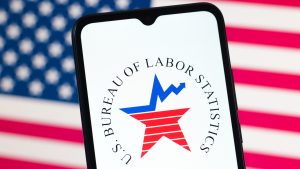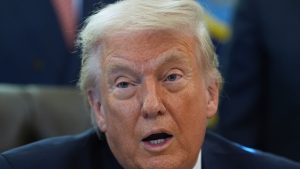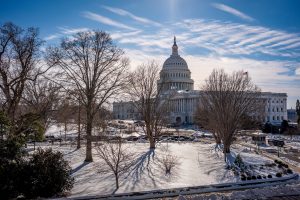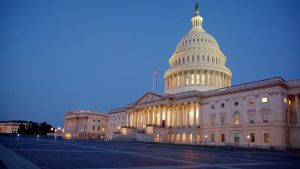Silicon Valley leans historically left, so why the sudden shift to the right?
President Donald Trump had a lot of support in his return to the White House. Leading that charge was Tesla CEO Elon Musk, and following not far behind him came other leaders from Silicon Valley. While the tech industry leaders have historically backed blue candidates, a sudden swing to the GOP has some Democratic party leaders concerned.
But what caused that swing?
Silicon Valley goes right
Straight Arrow News spoke with longtime California Democratic strategist Darry Sragow, who said it really comes down to basic economics.
In the beginning of Silicon Valley, the work being done was considered more liberal and unconventional and aligned more closely with the Democratic party and candidates like former President Bill Clinton.
But things have certainly changed since the early ‘90s.
“We’re talking about the founders, the owners, having accumulated incredible amounts of wealth and incredible amounts of economic power, and so, at some point, that’s why this is not a surprise. It’s inevitable that they’re going to want to protect what they’ve gotten, because they’ve gotten a lot,” Sragow said. “So that’s where the Republicans come in.”
Historically, the wealthy have supported GOP candidates because of Republicans’ typical support of tax cuts for wealthier Americans and corporations.
Between Musk, Meta CEO Mark Zuckerberg and Amazon CEO Jeff Bezos, there’s nearly $1 trillion of net worth, with each having companies that have more than $1 trillion market cap.
“Generally speaking, the Republicans will be more likely than the Democrats to favor lower taxes and to favor less regulation of all this industrial or technological activity,” Sragow said.
Sragow said people with money tend to want to hold onto it.
“It should come as no surprise that they will share that wealth to protect their own interests,” Sragow said. “They have every right to do that, and their interests are, in general, not to be taxed and not to be regulated. I mean, there’s nothing wrong with that, that’s just the position they’re in.”
2024 campaign season
While the shift has gradually taken place over the years, the biggest swing seemed to come during the 2024 campaign season, led by Musk.
Musk had not played much of a role in politics up until that point, leading the charge of new big-money players into the political sphere.
“That was a really interesting shift — that it was, at least during that cycle, initially not the big tech names that we had known to support the Democratic Party starting to support Trump and other conservatives or Republicans, but these new faces and new voices,” Anna Massoglia, a political influence researcher and the author of “Influence Brief,” told Straight Arrow News.
Musk is a good representation of that. He had donated to politicians before and even seemed to be somewhat close to former President Barack Obama.
But the more than $275 million he spent helping Trump get elected represents one-third of all the money Obama raised in total during the 2008 campaign. Obama’s campaign haul in 2008 preceded the landmark 2010 Citizens United v. FEC ruling that deemed corporate donations a form of protected speech.
It was the new political investors like Musk who helped push Trump back into power.
“The earlier investors in Donald Trump and conservatives during the 2024 cycle were new investors,” Massoglia said. “So those were tech executives coming out of the woodwork. The Elon Musks, who hadn’t given in the past.”
Once it became clear Trump was retaking the White House, some of the other typical players jumped into the game.
“That is when the big tech CEOs, that we know, the big-name CEOs, started to then give to Trump, and to some extent to other Republicans,” Massoglia said.
Names like Zuckerberg and Bezos, who joined Trump on stage at the inauguration.
There’s also the power of what money buys.
“Political contributions are not necessarily just a show of support,” Massoglia said. “They’re also a way to gain access, to amplify the views that they had and to effectively further their agenda, whether it’s in Congress or with the Trump administration.”
Should Democrats be concerned about the switch?
“Yes, there is a concern,” Sragow said. “There absolutely is a concern. But, I mean, there’s nothing new here.”
Nobody gets elected president without financial backing. While today it’s Silicon Valley, 100 years ago it was railroad and oil tycoons.
In 1904, Charles W. Fairbanks, the vice president of former President Theodore Roosevelt, was a railroad industry lawyer. Oil tycoon Harry F. Sinclair donated $160,000 (equivalent to about $2 million today) to former President Warren G. Harding’s campaign in 1920.
“It’s just history repeating itself,” Sragow said.
While big money in politics is nothing new, many of the people with those big checkbooks are — and the politicians have noticed.
“We are already seeing at the congressional level, candidates starting to make more active ties with Silicon Valley players who have not traditionally been as involved in political giving spaces,” Massoglia said.
Sragow said while money for campaigns is important, so is getting the electorate on your side and not worrying about this “predictable” change.
“[Democrats] gained power in this country back in the relatively early part of the 20th century by fighting for workers, for the people employed by the large companies,” Sragow said. “And that’s not presently part of this very superficial discussion that’s taking place.”
Things can change very quickly in America. In Silicon Valley, change is the name of the game.
Change is also a staple of the White House in recent decades. No party has managed to elect two different presidential nominees consecutively since the 1980s, with former presidents Ronald Reagan and George H.W. Bush.
So, could things switch up again?
“It’s been such a quick shift already, just during the 2024 cycle, I think that just in the final months of that cycle, it completely changed the face of who Silicon Valley supports in elections,” Massoglia said. “And so I think that it’s hard to say what shift happens next? Because it has been so quick, which very much echoes the rest of the tech world.”





